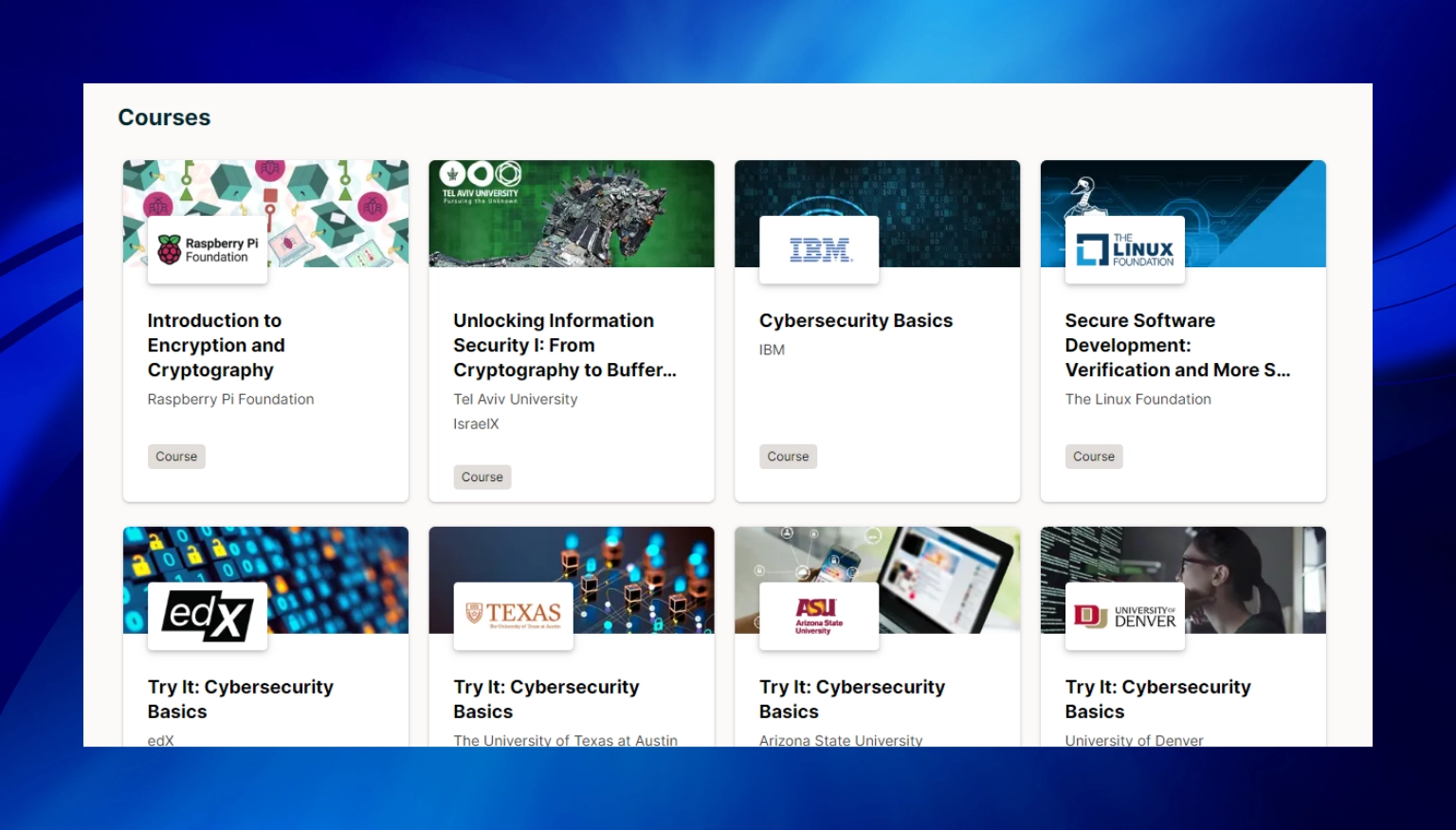In the contemporary digital landscape, safeguarding data and guaranteeing secure communication are imperative. This underscores the significance of jobs in cryptography, which utilize sophisticated algorithms for encryption to safeguard sensitive information from unauthorized access and breaches.
If you’re intrigued by the challenge of cracking codes and crafting digital safeguards, a career in cryptography might be perfect for you.
As we delve into the various roles and opportunities within this field—from security engineer to cryptographer—you’ll see how essential jobs in cryptography are, offering rewarding pathways for those with a knack for security solutions and a passion for problem-solving.
Let’s dive into the world of cryptography and uncover the potential it holds for aspiring professionals, starting with one of the most frequently asked questions by many who are eager to transition into this dynamic space.
Are There Careers in Cryptography?

The field of cryptography offers a broad spectrum of career opportunities crucial for protecting sensitive data and ensuring secure communication across various platforms.
From designing secure software to managing robust security systems, the roles within cryptography are diverse and pivotal.
Security engineers are at the forefront of the cybersecurity battle, developing and implementing security solutions that shield organizations from cyber threats.
Their work often leverages cryptographic algorithms and complexity theory to secure data transmissions and safeguard critical information from unauthorized access.

Cryptographers are specialized professionals focused on creating advanced cryptographic systems. This role demands more than a basic understanding of mathematical models, encryption algorithms, and security protocols.
They develop innovative methods to encrypt data and analyze existing security systems for vulnerabilities, employing skills in symmetric cryptography and digital signatures.
Security consultants provide expert advice to organizations on protecting critical information. They assess risks, devise security strategies, and ensure compliance with security standards and regulations.
Their role is essential in crafting security frameworks that effectively integrate cryptographic techniques, including hash functions and key exchange mechanisms.

Further, careers in cryptography include Security Analysts, who monitor and analyze security systems to detect any signs of compromise.
They use various cryptographic tools to fortify the security of computer systems and networks, focusing on preventing hackers and addressing security issues promptly.
The demand for these professionals is driven by the ongoing need to secure data in sectors like finance, healthcare, and government, emphasizing the protection of sensitive and financial data.
Now that we’ve outlined some of the most in-demand roles in the industry, let’s explore another frequently asked question regarding cryptography jobs.
What Educational Background Is Needed for a Career in Cryptography?

A career in cryptography demands a solid foundation in several academic disciplines, primarily computer science and mathematics.
Aspiring professionals often begin with a bachelor’s degree in computer science, cybersecurity, or a related field. This foundational education is crucial as it covers essential topics such as programming languages, computer systems, and basic security protocols.
To delve deeper into specialized subjects like cryptographic algorithms, encryption methods, and security systems design, many cryptographers pursue a master’s degree.
Advanced degrees typically include coursework in complex areas like number theory, mathematical models, and complexity theory—each essential for developing new encryption techniques and security solutions.

Strong math skills are indispensable, as cryptography often involves the creation and implementation of algorithms that require a deep understanding of advanced mathematics.
This mathematical acumen is crucial for those looking to innovate and solve sophisticated problems in securing digital communications and sensitive data.
Apart from formal schooling, practical experience gained from internships or research endeavors proves highly advantageous.
Engaging in practical work helps reinforce theoretical concepts and exposes students to real-world challenges in cybersecurity.
This experience is highly regarded by potential employers, especially in industries like national security and financial services, where protecting critical information is paramount.

Furthermore, continual learning and professional development are essential to keep pace with the rapidly evolving field of cybersecurity.
Certifications in specific security practices or technologies enhance a candidate’s job prospects and career growth, highlighting their expertise and dedication to the field.
Finally, soft skills such as problem-solving, analytical thinking, and effective communication are crucial. These abilities enable professionals to devise complex cryptographic solutions and effectively implement these strategies within their organizations or among their client bases.
Now, let’s consider whether the investment in education, certifications, and skills development pays off in the cryptography job market, especially concerning compensation.
Is Cryptography Well-Paid?

The financial rewards of a career in cryptography can be significant. Due to the critical nature of the roles and the specialized skills required, salaries in this field are generally above the national average salary.
Security engineers, cryptographers, and security consultants are among the top earners, with compensation reflecting their vital role in safeguarding digital assets.
Salaries vary depending on multiple factors such as geographical location, level of education, specific job titles, and industry. For example, professionals working in financial services or national security often command higher wages due to the sensitive nature of their work.
The increasing prevalence of cyber threats also ensures that skilled cryptographers remain in high demand, potentially driving salaries even higher as businesses and governments strive to protect their critical information.

In addition to a competitive salary, careers in cryptography often come with comprehensive benefits packages, including bonuses, health insurance, and retirement plans.
These roles can also offer the flexibility of remote work, appealing to those looking for a balance between their professional and personal lives.
As of 2024, the average salary for a cryptographer in the U.S. is approximately $115,178 annually, with the potential for additional pay through bonuses or profit sharing.
Some sources report a broader salary range from $93,000 to as high as $213,000 depending on the individual’s role, experience, and the complexity of their tasks.

For those entering the field, the variance in salary can also reflect the sector they choose to work in.
For example, cryptographers employed in financial services, government agencies, or advanced technology sectors may find themselves at the higher end of the salary spectrum due to the critical nature of their work.
This wide range in salary showcases the value and demand for skilled professionals in cryptography, emphasizing the importance of advanced education and specialized skills in securing higher compensation
Are Cryptographers in High Demand?

The demand for cryptographers and other cybersecurity professionals continues to grow as the digital landscape evolves and expands.
With the increasing incidence of cyberattacks and the continuous need for improved data security, the expertise of cryptographers is more crucial than ever.
Businesses, governments, and organizations across various sectors are actively seeking individuals who can develop, implement, and manage secure systems to protect sensitive data and maintain secure communication.

This demand is not just for mitigating current threats but also for preparing against future vulnerabilities, making the field of cryptography a dynamic and continuously evolving landscape.
As technology advances and more aspects of our daily lives and critical infrastructures become digitized, the need for robust encryption and security solutions is expected to increase, ensuring a sustained demand for skilled professionals.
Those with expertise in the latest cryptographic techniques, such as advanced cryptography, symmetric encryption, and cryptographic algorithms, will find themselves particularly well-positioned in the job market.
Jobs in Cryptography: Key Skills and Qualifications for Cryptographers

Professionals in cryptography blend a strong academic background with specific technical skills and personal attributes.
Here’s a breakdown of the essential qualifications, including the typical educational degrees held by cryptographers:
Educational Degrees
- Bachelor’s Degree: Most cryptographers start with a bachelor’s degree in computer science, mathematics, or a related field. This foundational degree covers essential topics like data structures, algorithms, and basic programming.
- Master’s Degree: A master’s degree in cybersecurity, computer science, or a related discipline is often required for advanced positions. This degree typically includes specialized coursework in cryptographic algorithms, information security, and advanced computer systems.
- PhD: Some cryptographers pursue doctoral degrees, especially those involved in research or academic positions. A PhD allows for deep specialization in areas like encryption algorithms, mathematical models for cryptography, or complex data security challenges.
Technical Skills
- Encryption and Cryptographic Algorithms: Mastery of these is crucial, as they are the foundation of secure communication and data protection.
- Computer Systems and Information Technology: Comprehensive knowledge is necessary to implement and manage secure systems effectively.
- Programming Languages: Proficiency in languages such as C++, Java, and Python is vital for developing and testing cryptographic software.
Soft Skills
- Problem-Solving: Essential for addressing the multifaceted challenges in cybersecurity.
- Analytical Thinking: Critical for assessing systems’ vulnerabilities and devising robust security measures.
- Communication: Key for conveying complex cryptographic concepts clearly to non-specialists.
Advanced Knowledge and Certifications
Certifications like Certified Information Systems Security Professional (CISSP) or Certified Encryption Specialist (ECES) can distinguish a cryptographer in the job market.
Practical Experience
- Cybersecurity and Penetration Testing: Real-world experience in these areas is invaluable.
- Research: Keeping abreast of the latest security threats and innovations in cryptographic techniques through ongoing research is crucial.
These qualifications pave the way for professionals to effectively tackle the diverse and evolving challenges in cryptography, making them well-equipped to secure communication channels and protect sensitive data against cyber threats.
The Most In-Demand Cryptography Jobs

The cryptography field offers a variety of roles that vary depending on the qualifications and salaries. Below are some of the job titles that are currently in high demand, along with their typical requirements and compensation:
Security Engineer
- Qualifications: Bachelor’s degree in Computer Science, Cybersecurity, or a related field; certifications like CISSP or CISM can be advantageous.
- Experience: Typically requires 3-5 years of experience in IT security or a related field.
- Average Salary: $95,000 to $155,000 annually, depending on experience and location.
Cryptographer
- Qualifications: Advanced degree in Mathematics, Computer Science, or Cryptography; strong knowledge of cryptographic algorithms and data security principles.
- Experience: Often requires at least 2-4 years of experience in cryptography research or applied cryptography.
- Average Salary: $115,000 to $213,000 annually, varying significantly with specific skills and the nature of the employment sector.
Security Consultant
- Qualifications: Bachelor’s or master’s degree in IT, Cybersecurity, or a related field; professional certifications are highly regarded.
- Experience: 5+ years in cybersecurity, with a focus on consulting and system analysis.
- Average Salary: $85,000 to $130,000 annually, which can increase significantly with expertise in cryptographic techniques and seniority.
Cryptographic Analyst
- Qualifications: Degree in Computer Science, Cybersecurity, or related fields; must be proficient in algorithms and encryption methods.
- Experience: 2-3 years of experience in data analysis or security analysis, with specific training in cryptography.
- Average Salary: $70,000 to $110,000 annually, depending on industry and level of responsibility.
These roles require a mix of technical knowledge, practical experience, and sometimes specific certifications.
The salaries reflect the high demand and specialized skills needed in these positions, highlighting the lucrative nature of careers in cryptography.
Advancements and Opportunities in Cryptography

Cryptography is a dynamic field that continuously evolves in response to new security challenges and technological advancements.
Professionals in this field must stay abreast of these changes to remain effective and in demand. Here are some of the key areas of advancement and the opportunities they present:
Emerging Technologies and Cryptography
The integration of cryptography with emerging technologies like blockchain, quantum computing, and Internet of Things (IoT) devices presents new challenges and opportunities. These technologies require advanced cryptographic solutions to ensure data integrity and security, opening up specialized career paths for those with the right skills.
Advanced Cryptography Techniques
As cyber threats become more sophisticated, there is a growing need for innovative cryptographic methods such as post-quantum cryptography, homomorphic encryption, and zero-knowledge proofs.
These advanced techniques offer opportunities for cryptographers to engage in cutting-edge research and implementation, often in high-stakes industries such as national security and financial services.
Cybersecurity and Information Security
The rise in cyber-attacks and data breaches has increased the demand for professionals who can develop and manage comprehensive security solutions.
This includes not only the creation of new cryptographic methods but also the implementation and maintenance of existing ones across various platforms and industries.

Education and Training
With the growing complexity of cybersecurity threats, there is a significant demand for cryptographers who can train and educate the next generation of security professionals.
Opportunities in academia, such as becoming a university professor or corporate trainer, are abundant for those who wish to share their expertise.
Consulting and Advisory Roles
Many organizations lack in-house expertise in advanced cryptography and rely on consultants to design secure systems and strategies.
Cryptographers with extensive experience and a solid track record can find lucrative opportunities in consulting roles, helping businesses navigate the complexities of information security.
Salary and Career Growth
The advancements in cryptography not only enhance the security of digital communications and data but also contribute to the career growth and financial prospects of the professionals involved.
As the need for advanced security measures increases, so does the value placed on skilled cryptographers, making it a financially rewarding career.
Global Opportunities
Cryptography is a global field with opportunities spanning across borders.
Whether it’s working for multinational corporations, international security agencies, or global nonprofits, cryptographers can find roles that suit their skills and interests anywhere in the world
Where Can I Improve My Knowledge? Free Resources to Learn Cryptography
If you’re self-motivated and eager to dive into the world of cryptography and prefer to start with free online resources, there are several excellent courses available that cater to both beginners and those looking to deepen their knowledge and gain experience.
Here’s a detailed guide to where you can learn cryptography online at no cost:
Cryptography I by Stanford University on Coursera

This comprehensive course, taught by renowned professor Dan Boneh, covers the fundamentals of cryptography.
It includes topics like public-key encryption and cryptographic security. The course is well-structured for beginners but also delves into more complex concepts for those looking to expand their knowledge.
Although the course itself is free, there is an option to pay for a certificate upon completion if you choose.
Learn more about Cryptography I on Coursera
Introduction to Cryptography for Beginners by Simplilearn

This beginner-friendly course provides a certificate upon completion and does not require any prior knowledge of mathematics or computer science.
It’s an excellent starting point for anyone new to the field and covers essential cryptographic concepts. The course is accessible for 90 days, providing ample time to grasp the basics.
Explore Introduction to Cryptography for Beginners on Simplilearn
Cryptography Courses on edX

edX offers a variety of cryptography courses from top universities and institutions. These courses range from beginner to advanced levels and cover different aspects of cryptography, including encryption techniques and security systems.
While some courses on edX are free to audit, you might have to pay for certified access which includes assessments and a certificate.
Check out Cryptography courses on edX
Free Cryptography Courses on Alison

Alison’s free course, “An Introduction to Cryptography,” is designed to help learners understand the foundational knowledge of cryptography.
It discusses historical ciphers, principles of modern cryptography, and more. Completing the course can earn you a free digital or framed diploma, ideal for enhancing your professional profile.
Udemy Cryptography Courses

Udemy offers several free and paid courses on cryptography that cater to different skill levels.
These courses cover everything from basic principles to more advanced topics like blockchain and cyber security.
They are ideal for those looking to enhance their resume and gain comprehensive knowledge in the field.
Explore Cryptography courses on Udemy
Each of these platforms provides valuable resources for anyone interested in learning cryptography, from basic concepts to more advanced applications.
Whether you’re looking to enhance your skills for professional development or personal interest, these free courses are a great place to start.
Jobs in Cryptography: Final Thoughts on the Growing Opportunities in the Industry

As we’ve explored throughout this article, careers in cryptography offer a unique combination of challenge, opportunity, and reward.
Professionals in this field are crucial in securing data and communications across various sectors, making it a dynamic and indispensable area of expertise.
Whether you’re a budding security engineer, a researcher poised to advance cryptographic algorithms, or an educator shaping the next generation of cryptographers, the opportunities are vast and varied.
Employment Growth and Demand
The demand for skilled cryptographers is expected to grow as digital threats evolve and the need for robust cybersecurity intensifies. Jobs in cryptography, such as security consultants, security researchers, and security analysts, remain in high demand, especially as industries from finance to national security increasingly rely on digital solutions.
Diverse Career Paths
From working on advanced cryptography in academic settings to implementing practical encryption solutions in the tech industry, the career paths are diverse. Those with a strong math skills foundation and a master’s degree in computer science or a related field will find themselves particularly well-prepared. Emerging areas like quantum cryptography and cryptographic primitives offer new avenues for specialization and research.
Continuous Learning and Adaptation
The field of cryptography requires a commitment to continuous learning and adaptation. With technologies and threats constantly evolving, staying updated through ongoing education and professional development is crucial. Free online resources, such as courses from platforms like Coursera, edX, and Alison, provide accessible ways to keep pace with the latest developments.
A Fulfilling and Lucrative Field
Cryptography not only challenges the intellect but also offers significant financial rewards. Security engineers and cryptographers often enjoy salaries that reflect the high demand and specialized skills required in this field. Moreover, the satisfaction of contributing to the security and integrity of information systems is a rewarding aspect of the career.

In conclusion, a career in cryptography is not just about securing data but also about forging a path that is intellectually stimulating, financially rewarding, and crucial to the digital security landscape.
For those intrigued by the prospect of protecting sensitive information and solving complex problems, cryptography offers a promising and impactful career trajectory.
Whether you are just starting out or looking to deepen your expertise, the world of cryptography welcomes you with challenges to overcome and new heights to achieve.
So, arm yourself with knowledge, sharpen your skills, and prepare to make a significant impact in the ever-evolving domain of cybersecurity.
Interested in learning more? Don’t miss our best educational articles:
- What is Decentralized Physical Infrastructure?
- What are Testnets? Delving into Key Blockchain Dev Environments
- Permissioned vs Permissionless Blockchain: What Are They?
- What Is the Best Crypto Accounting Software?
- Crypto.com vs Binance: Which Platform Wins for Cryptocurrency Trading?
Discover them all by visiting our Learn section!

